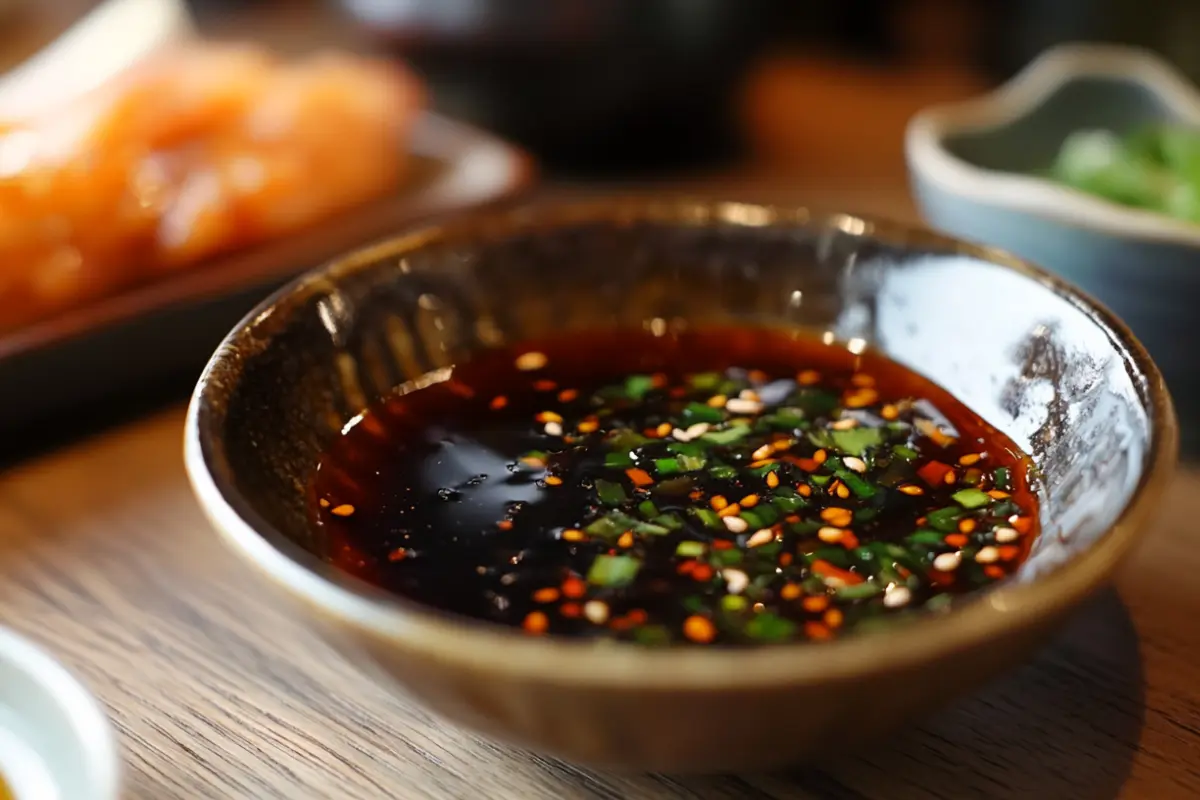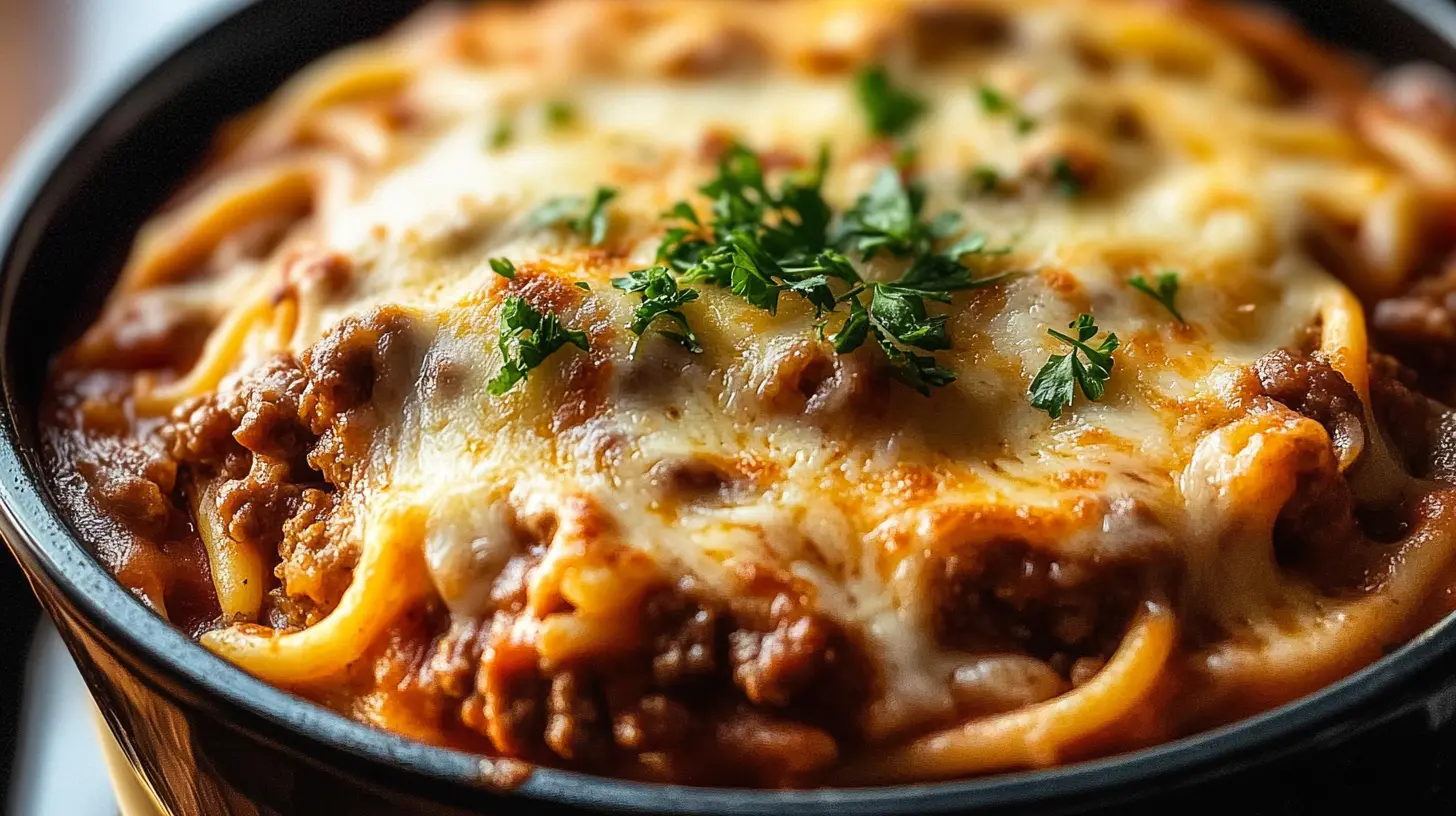Introduction to Japanese BBQ Sauce Recipe
Japanese BBQ sauce, also known as “Yakiniku no Tare,” is a flavorful, versatile condiment that elevates any grilled dish to a new level of deliciousness. This Japanese BBQ sauce recipe combines a perfect balance of sweet, savory, and umami flavors, making it an ideal accompaniment for meats, vegetables, and even seafood. Simple to prepare, this sauce requires only a few key ingredients that are likely already in your pantry. With its gluten-free and vegan-friendly variations, this recipe caters to various dietary needs, ensuring everyone can enjoy it.
Whether you’re a busy parent looking for a quick and tasty addition to weeknight dinners, a student exploring new cooking styles, or a food enthusiast interested in Japanese cuisine, this sauce will undoubtedly become a staple in your kitchen. Moreover, its health benefits are noteworthy as well; using ingredients like soy sauce, mirin, and garlic not only provides depth of flavor, but also offers antioxidants and digestive aids. Furthermore, before we dive into this exciting recipe, it’s important to note that making your own sauce allows for customization, thus ensuring it perfectly suits your taste and dietary preferences. So, let’s get started on crafting this delicious addition to your culinary repertoire! don’t forget to explore our healthy lamb chop recipes for another delicious meal idea that pairs beautifully with this sauce!
Why Make Your Own BBQ Sauce at Home?
Creating your own Japanese BBQ sauce at home comes with numerous benefits:
1. Healthier Choices with Homemade Sauces
Making your own Japanese BBQ sauce means you control what goes into it, allowing for healthier choices. By opting for low-sodium soy sauce and natural sweeteners like honey or agave, you reduce the amount of processed sugars and unhealthy fats typically found in store-bought sauces. Additionally, ingredients like garlic and ginger provide anti-inflammatory properties and boost your immune system, making this a health-conscious choice for any meal.
2. Quick and Easy Preparation for Busy Cooks
This Japanese BBQ sauce recipe is incredibly easy to make, requiring minimal cooking skills and less than 10 minutes to prepare. It’s perfect for home cooks of all experience levels, including busy parents and working professionals looking for a quick yet delicious solution to enhance their meals. The ingredients are readily available, and the steps are straightforward, ensuring anyone can whip up a batch with ease.
3. Versatility for Various Dietary Needs
One of the standout features of this Japanese BBQ sauce is its adaptability to different dietary preferences. With a few simple substitutions, this recipe can easily become vegan, gluten-free, or even low-calorie. For example, swapping out soy sauce for tamari makes it gluten-free, and using agave instead of honey keeps it vegan. Such flexibility ensures that this sauce can be enjoyed by everyone, regardless of dietary restrictions.
4. Unique Flavor Profile of Japanese BBQ Sauce
The combination of sweet, salty, and umami flavors in this sauce creates a unique taste that enhances a wide variety of dishes. Whether you’re using it as a marinade for meats, a dipping sauce for vegetables, or even a drizzle over rice, this Japanese BBQ sauce adds depth and complexity to your meals. Its distinctive flavor can transform a simple dish into a memorable culinary experience.
5. Cost-Effectiveness and Customization
Making your own sauce at home is often more cost-effective than buying pre-made sauces from the store. You can customize the flavor to suit your personal taste preferences, adjusting sweetness, saltiness, or spiciness levels as desired. This not only saves money but also results in a fresher, more flavorful sauce.
Ingredients Overview for Japanese BBQ Sauce Recipe
Essential Ingredients for Japanese BBQ Sauce Recipe
- Soy Sauce: 1/2 cup. Provides a salty, umami base for the sauce. Use tamari for a gluten-free option.
- Mirin: 1/4 cup. A sweet Japanese rice wine that adds depth and a subtle sweetness.
- Sake: 1/4 cup. Enhances the flavor with its slight acidity and depth.
- Brown Sugar: 2 tablespoons. Adds sweetness and a caramel-like flavor. Substitute with honey or agave for a different sweetness profile.
- Garlic: 2 cloves, minced. Offers a robust flavor and various health benefits, including boosting immunity.
- Ginger: 1 tablespoon, grated. Adds a fresh, spicy kick and aids digestion.
- Sesame Oil: 1 tablespoon. Provides a nutty aroma and flavor, essential for authentic Japanese taste.
- Toasted Sesame Seeds: 1 tablespoon. Adds texture and a mild, nutty flavor to the sauce.
Vegan, Gluten-Free, and Low-Calorie Options for Japanese BBQ Sauce
- Vegan Option: Replace honey with agave or maple syrup.
- Gluten-Free Option: Use tamari instead of soy sauce to ensure the sauce is gluten-free.
- Low-Calorie Option: Substitute brown sugar with a low-calorie sweetener like stevia or monk fruit.
Dietary Substitutions to Customize Your Japanese BBQ Sauce Recipe
- For a Sugar-Free Version: Replace brown sugar with a sugar-free alternative like erythritol or monk fruit sweetener.
- For a Low-Sodium Diet: Opt for low-sodium soy sauce or tamari to reduce the sodium content without sacrificing flavor.
- For an Alcohol-Free Sauce: Omit the sake and replace mirin with a combination of apple cider vinegar and water for a similar tangy flavor profile.
How to Prepare the Perfect Japanese BBQ Sauce Recipe: Step-by-Step Guide
Step-by-Step Instructions for Making Japanese BBQ Sauce
First Step: Prepare Your Ingredients
Gather all ingredients listed above. Mince the garlic and grate the ginger to ensure they are ready for use. Measure out the soy sauce, mirin, sake, brown sugar, and sesame oil.
Second Step: Combine the Ingredients
In a small saucepan, combine the soy sauce, mirin, sake, brown sugar, minced garlic, and grated ginger. Stir the mixture over medium heat until the sugar has completely dissolved, and the sauce begins to simmer.
Third Step: Reduce and Thicken the Sauce
Allow the sauce to simmer gently for 5-7 minutes, stirring occasionally. This will help to thicken the sauce and concentrate the flavors. Be careful not to boil it vigorously, as this can cause the sauce to become too salty.
Fourth Step: Add Sesame Oil and Toasted Sesame Seeds
Once the sauce has thickened to your desired consistency, remove it from heat. Stir in the sesame oil and toasted sesame seeds. These ingredients add a rich, nutty flavor and aroma to the sauce, making it more complex and authentic.
Fifth Step: Cool and Store the Sauce
Allow the sauce to cool slightly before transferring it to a jar or airtight container. Store in the refrigerator for up to two weeks. The flavors will meld and deepen over time, making it even more delicious after a day or two.
Mastering Japanese BBQ Sauce Recipe: Advanced Tips and Variations
Advanced Tips for Perfecting Japanese BBQ Sauce
- Adjusting Sweetness and Saltiness: Taste the sauce as it cooks and adjust the sweetness or saltiness by adding more sugar or soy sauce, respectively.
- Adding a Spicy Kick: For those who enjoy a bit of heat, add a pinch of red pepper flakes or a dash of sriracha sauce to the mixture.
- Incorporating Citrus Zest: For a fresh twist, add a small amount of citrus zest, such as lemon or orange, to brighten the flavors and add a subtle complexity.
- Thicker Sauce for Glazing: If you prefer a thicker sauce for glazing meats or vegetables, let it simmer for an additional 2-3 minutes until it reaches your desired consistency.
How to Store Japanese BBQ Sauce Recipe: Best Practices
Storing and Reheating Japanese BBQ Sauce
- Refrigeration: Store the sauce in an airtight container in the refrigerator for up to two weeks. Shake or stir before each use to redistribute the ingredients.
- Freezing: For longer storage, freeze the sauce in ice cube trays. Once frozen, transfer the cubes to a freezer-safe bag and store for up to three months. Thaw cubes in the refrigerator as needed.
- Reheating: Gently reheat the sauce in a saucepan over low heat, stirring occasionally until warmed through. Avoid high heat to prevent burning or altering the flavor.
Nutritional Value of Japanese BBQ Sauce Recipe
Nutritional Benefits of Homemade Japanese BBQ Sauce
Each serving (about 1 tablespoon) of this Japanese BBQ sauce provides:
- Calories: Approximately 15-20
- Protein: Less than 1g
- Fat: 1g (mostly from healthy sesame oil)
- Carbohydrates: 2-3g (depending on sweeteners used)
- Fiber: 0g
- Sodium: 150-200mg (can be reduced with low-sodium soy sauce)
This sauce is relatively low in calories and fat, making it a great option for those looking to add flavor without a significant caloric impact.
FAQs: Frequently Asked Questions About Japanese BBQ Sauce Recipe
Common Questions About Japanese BBQ Sauce Recipe
Q1: Can I Make Japanese BBQ Sauce Ahead of Time?
Yes, this sauce can be made ahead of time and stored in the refrigerator for up to two weeks, allowing the flavors to deepen.
Q2: What Dishes Can I Use Japanese BBQ Sauce With?
This sauce is perfect for marinating meats, as a dipping sauce for vegetables, or as a finishing sauce for grilled dishes.
Q3: How Can I Make the Sauce Less Salty?
To reduce the saltiness, use low-sodium soy sauce or dilute the sauce with a bit of water or vegetable broth.
Q4: Is Japanese BBQ Sauce Gluten-Free?
Yes, by using tamari instead of regular soy sauce, you can make this sauce gluten-free.
Q5: Can I Add Other Flavors to This Sauce?
Absolutely! Feel free to add ingredients like miso paste for umami depth, or a dash of rice vinegar for extra tanginess.
Q6: How Does Japanese BBQ Sauce Differ from Other BBQ Sauces?
Japanese BBQ sauce typically has a sweeter and more savory profile, often incorporating ingredients like soy sauce, mirin, and sake, unlike Western BBQ sauces which are often more tomato-based.
By crafting your own Japanese BBQ sauce recipe at home, you can enjoy a versatile, flavorful addition to any meal that is both healthier and more tailored to your taste preferences. Happy cooking!
1. What makes Japanese barbecue sauce different?
Japanese barbecue sauce, commonly referred to as “Yakiniku no Tare,” is distinct from other barbecue sauces due to its unique combination of flavors. Unlike Western BBQ sauces, which often have a smoky and tomato-based profile, Japanese BBQ sauce focuses on balancing sweet, savory, and umami flavors. It typically includes ingredients like soy sauce, mirin (a sweet rice wine), sake, garlic, ginger, and sesame oil. This blend provides a richer, more complex flavor that enhances the natural taste of grilled meats and vegetables without overpowering them. The use of these traditional Japanese ingredients creates a sauce that is not only flavorful but also versatile for various culinary uses. For more on Japanese cuisine, see Wikipedia.
2. What is the Japanese version of BBQ sauce?
The Japanese version of BBQ sauce is called Yakiniku no Tare. “Yakiniku” translates to “grilled meat,” and “tare” means sauce. This sauce is specially designed for grilled meats, particularly beef, and is used both as a marinade and a dipping sauce. The sauce’s base is usually soy sauce, with added sweetness from mirin or sugar, and a depth of flavor from ingredients like garlic, ginger, and sesame oil. It’s commonly used in Yakiniku restaurants, where diners grill their own meat at the table.
3. Is Japanese BBQ sauce the same as teriyaki sauce?
No, Japanese BBQ sauce is not the same as teriyaki sauce, though they share some common ingredients like soy sauce and sugar. Teriyaki sauce is thicker and primarily sweet, often used to glaze meats, providing a shiny, caramelized coating. On the other hand, Japanese BBQ sauce is thinner and has a more balanced combination of sweet, salty, and umami flavors. It is used as both a marinade and a dipping sauce, offering more versatility compared to the primarily glazing role of teriyaki sauce.
4. What is the difference between Japanese and Korean BBQ sauce?
Japanese BBQ sauce, known as Yakiniku no Tare, and Korean BBQ sauce, such as those used in Bulgogi or Galbi, differ significantly in both flavor and ingredients. Firstly, Japanese BBQ sauce focuses on a harmonious balance of sweetness, saltiness, and umami, typically using ingredients like soy sauce, mirin, sake, garlic, and ginger. On the other hand, Korean BBQ sauce often incorporates pear or apple juice for sweetness, along with soy sauce, garlic, and sometimes gochujang (Korean chili paste) for a bit of spice. Moreover, Korean BBQ sauces tend to be sweeter and spicier, with a thicker consistency, especially those designed for marinating. Therefore, while both sauces are delicious and versatile, they each bring a distinct flavor profile to the table, making them unique in their own right.
5. Does Bachan’s need to be refrigerated?
Yes, Bachan’s Japanese BBQ sauce should be refrigerated after opening. Like many sauces that contain natural ingredients and lack preservatives, refrigeration helps maintain its freshness and flavor. Keeping the sauce in the fridge also prevents bacterial growth and extends its shelf life, ensuring it stays safe to use over time.
6. How to thicken Japanese barbecue sauce?
To thicken Japanese barbecue sauce, you can simmer it on low heat until it reduces to your desired consistency. Another method is to add a cornstarch slurry (a mixture of cornstarch and water) to the sauce while it’s simmering, stirring continuously until it thickens. Adding a small amount of honey or sugar can also help thicken the sauce slightly while adding a touch of sweetness.
7. Can I use Bachan’s as a marinade?
Yes, Bachan’s Japanese BBQ sauce can be used as a marinade. Its balanced flavors of sweet, savory, and umami make it an excellent choice for marinating meats, particularly beef, chicken, or pork. The sauce helps tenderize the meat while imparting a rich flavor that enhances the grilling experience. Marinate the meat for at least 30 minutes or up to 24 hours in the refrigerator for best results.
8. Can you use Bachan’s as a dipping sauce?
Absolutely! Bachan’s Japanese BBQ sauce is versatile and can be used as a dipping sauce for various dishes, including grilled meats, vegetables, dumplings, and even sushi rolls. Its flavor profile complements a wide range of foods, making it a popular choice for adding a delicious finish to any meal.
9. What does bachan mean in Japanese?
“Bachan” is a colloquial term in Japanese that means “grandmother.” It is an affectionate term used to refer to one’s grandma, reflecting a sense of warmth, comfort, and tradition—much like the comforting and traditional flavors found in Bachan’s Japanese BBQ sauce.
10. What is another name for Japanese BBQ?
Another name for Japanese BBQ is Yakiniku. The term “Yakiniku” literally translates to “grilled meat” in Japanese and refers to the popular dining style in Japan where small pieces of meat are grilled on a tabletop grill and enjoyed with a variety of dipping sauces, including Yakiniku no Tare.
Conclusion
Japanese BBQ sauce, known as Yakiniku no Tare, is a distinctive condiment that brings a unique balance of sweet, savory, and umami flavors to grilled dishes. Unlike other BBQ sauces, its ingredients, such as soy sauce, mirin, and sake, offer a lighter, more nuanced taste, making it perfect for enhancing the natural flavors of meats and vegetables. Furthermore, while it differs from teriyaki sauce and Korean BBQ sauces in terms of flavor and use, new, Japanese BBQ sauce provides a delicious, health-conscious option that caters to a variety of culinary preferences Thus, Explore more about different sauces and culinary traditions by visiting Wikipedia.

Posted by: Hailee | October 22, 2024
I’m passionate about sharing sweet and savory recipes that I’ve meticulously tested and perfected in my own kitchen. Join me on this delicious journey to experience the best of culinary creativity.





1 thought on ““Easy Japanese BBQ Sauce Recipe””